Why I am putting up union jacks on my high street
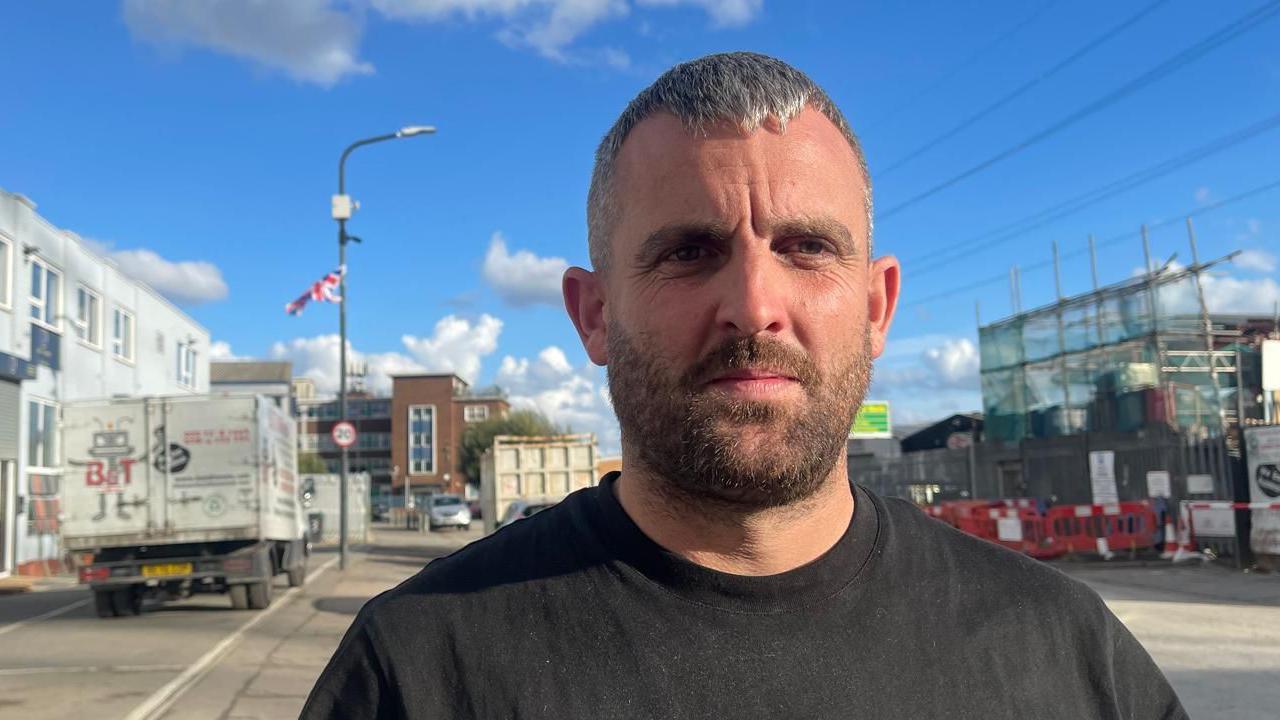
Billy Cooper said it was not "taboo" to be British
- Published
"A flagger, I believe, is somebody trying to rekindle a bit of British pride," says Billy Cooper, a roofer from south-west London.
The 38-year-old from Carshalton says he is part of a group of 30 people who have been attaching union jacks to lampposts in the borough of Sutton.
"It's the country's flag, it's the flag that we're all united under and people shouldn't be ashamed of it," he says. "It's not taboo to be British, we should be proud to be British."
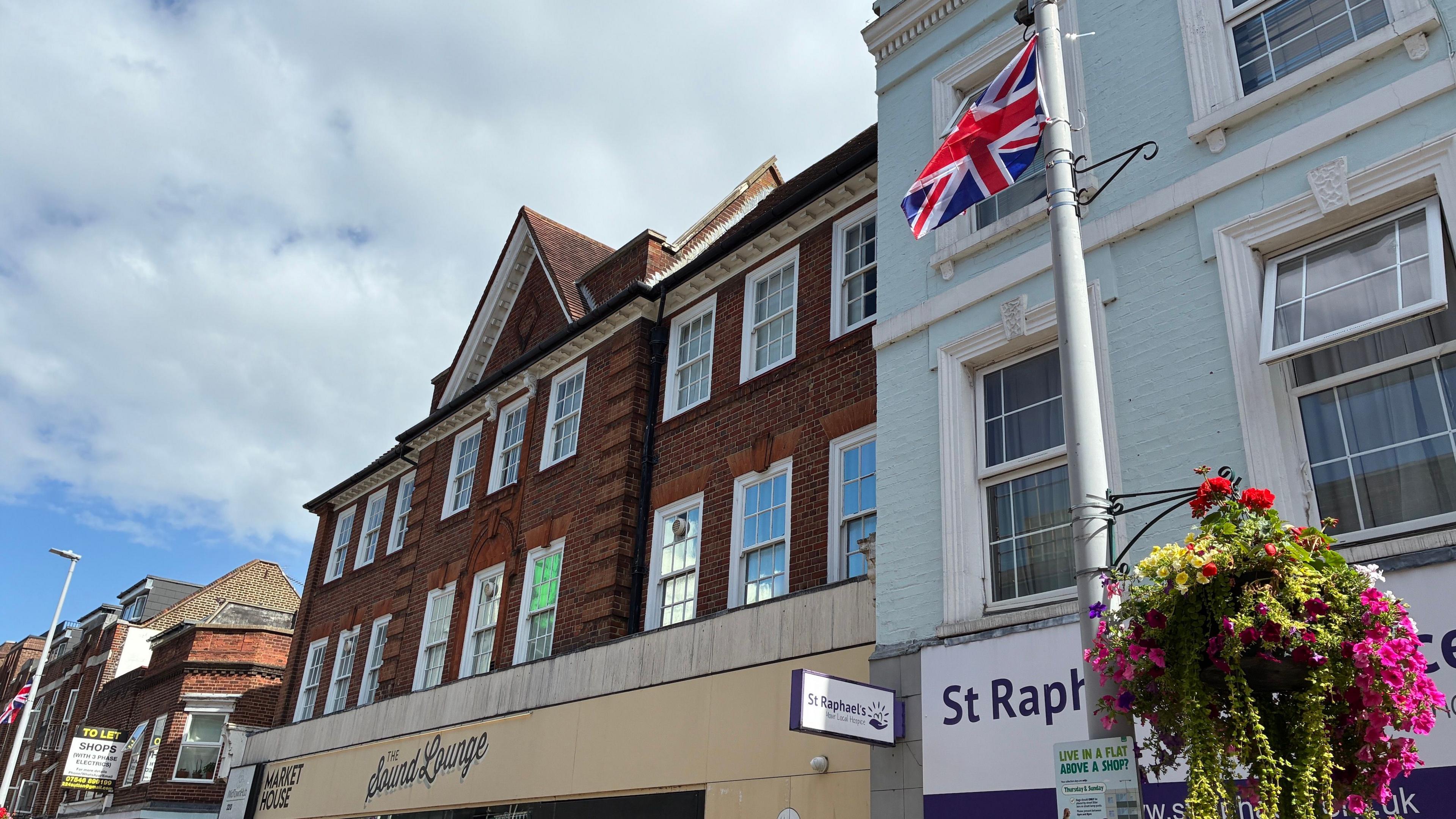
Union jacks now line the High Street in Sutton
Mr Cooper said his group decided to erect flags in Sutton after seeing social media posts of people doing similar things in their area.
"Ever since we started it, we've had people come up and give us donations, we've had people cheering us - not just white British people, people from all different backgrounds," he said.
"We're not hiding ourselves, we're not masked up, we're not screaming and shouting when we're doing it. We're doing it openly, in front of everyone."
Union jacks and St George's flags have been appearing in communities across the country since mid-July and have divided opinion.
It is rare to see national flags lining our streets like this in Great Britain, beyond special occasions like royal, sporting or military events.
Some view these unofficial displays as a patriotic gesture, while others regard them as a challenge to the presence of asylum seekers and of people not born in the UK more generally.
"Operation Raise the Colours" is one group that has encouraged people to put up flags. However for others, the raising of flags appears to be spontaneous, coinciding with a highly charged political time in the UK, particularly England, when it comes to national identity and belonging.
Union jacks and St George's flags have also featured heavily among the placards at protests outside some hotels housing asylum seekers.
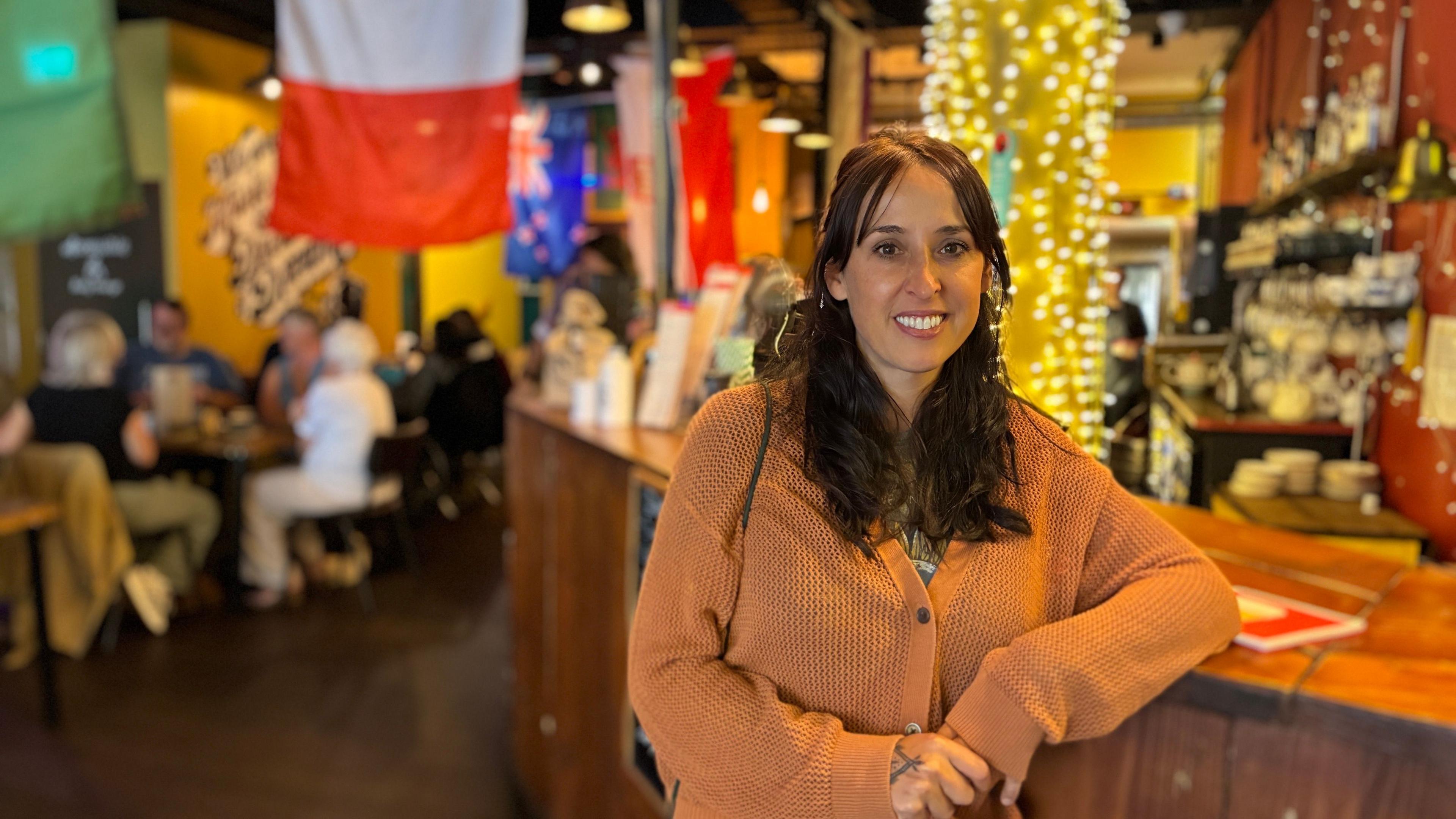
Hannah White said she confronted a group of men putting up flags on lampposts
In Sutton, the local council has said the flag is a symbol of civic pride and unity and it would continue to fly the national flag from public buildings. But it added that unauthorised flags on public property would be removed.
Hannah White, from Sutton music venue The Sound Lounge, said she received a hostile reaction when she spoke to a separate group of men with ladders, who were wearing masks and had stopped to attach a union jack to a lamppost on the High Street on 29 August.
She said: "They were shouting at me, 'What country are you from? What country is this?'
"I went to bed upset. My husband is a mixed-race man and he's had some difficult experiences.
"I don't want to be angry against people who are feeling like they want to celebrate their flag. It's just, how do we celebrate everyone?
"How do we make people feel safe and included without erasing the voices of people who feel that they need to put up a union flag? Because that's valid and relevant too."
Ms White said she wrote about her experience on Facebook and invited local people to bring other flags from different countries and with other meanings to the venue.
She said that as a result, she had exchanged friendly messages with Mr Cooper and planned to meet for a drink to discuss their points of view.
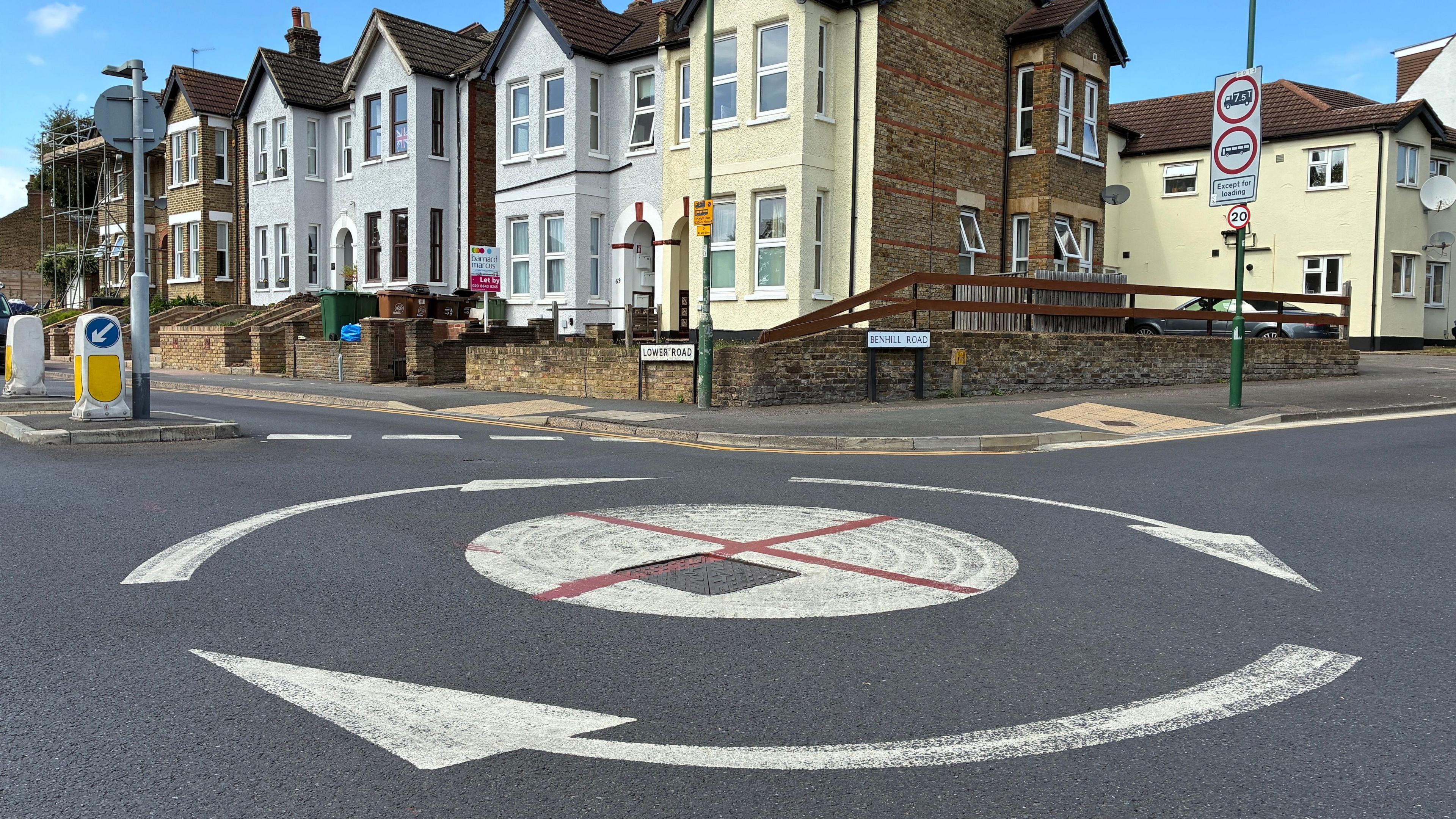
Roundabouts and crossings in Sutton have been painted with the St George's cross
Elsewhere in Sutton, red crosses have been painted on white mini roundabouts to emulate the pattern of the St George's cross.
Mr Cooper said: "Flags have, especially the English flag, over the years have been used for the wrong purpose.
"Because of the multicultural society that we live in now, there are a lot of people that can be offended by the flags, if they think that the meaning is the wrong way."
He added: "Unfortunately with any kind of movement, you are going to get the undesirables. We can't control the masses, we can only control ourselves in these situations and the guys that are with us."
Mr Cooper said he would not consider himself right-wing, but added: "I'm definitely on the right. I'm pro-British. It's not racist to be proud of being British and to want to protect your own country."
"We do see a lot of propaganda. I'm very tolerant, but I'm not tolerant of people who I believe are coming here to take the mickey."
Luke Taylor, MP Sutton and Cheam, said it was important that street furniture was kept "safe and clear".
"I think the council will need to take [the flags] down, but again, there are opportunities to look at where we want to be putting more flags up around the borough if that's what people want," he said.
"The council have community funding available. Sutton has got a great record of working together with community groups and working out how we get permanent and proper displays of our national symbols."
Why have thousands of St George's flags gone up in cities and towns?
- Published30 August
Where did the St George's flag come from?
- Published31 August
Mr Cooper said the "flaggers" were "community-led".
"We don't trust the councils, they don't listen to us anyway," he said.
"These are hardworking business people that are all funding this, it's not coming out of just my pocket, it's coming out of the whole community's pocket.
"It would fall on deaf ears if we asked the councils."
Many Britons' relationship with the union jack and the four nations' flags is complex. In Northern Ireland, the display of flags to both mark territory and express cultural identity has long been a divisive issue.
Sociologist and author Ellis Cashmore believes those displaying the flags are likely to have different reasons for doing so, but generally feel a sense of being left behind or overlooked.
Mr Cooper echoed this feeling. He said: "I feel the country has been let down, I feel the people are in a fearful state about the way the country is, we're not being listened to.
"I believe the government are causing people to take more drastic measures... They don't listen."
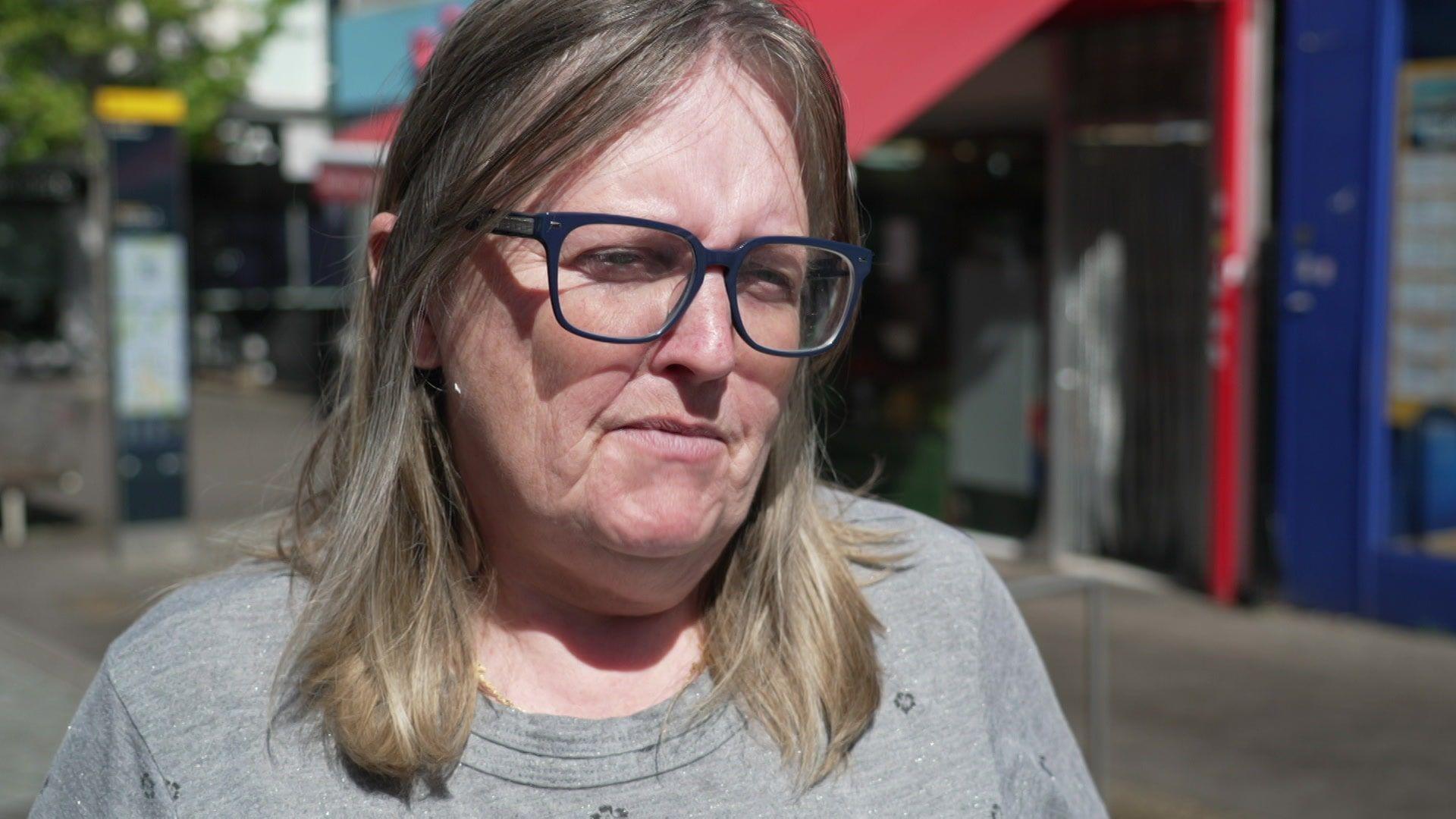
One woman told BBC London she did not believe the motivation for erecting flags was purely patriotism
On Sutton High Street, one woman told BBC London the appearance of the flags made her feel worried about the message behind them.
"All of a sudden, now people want to be patriotic," she said. "I think there's a whole lot of misinformation out there about refugees and their status. They're not living in luxury hotels by any means.
"Sure, fly the flags, that's fine, but if you're doing it because you're part of this racist movement, then I'm not okay with that.
"If you're doing it purely and simply because you're proud to be British and you're proud of your country, then sure. I just don't think it's about that right now."
'They say it's about patriotism, but it's not entirely'
Another woman said she was happy to see the flags: "I'm glad they've done it. This is Britain, we're British and we want to stay British.
"There's nothing for us, the British. It's all for the foreigners now. They come over here expecting to change our laws. Sod off. If you don't like our laws, go back.
"Us British are proud of our country, but it's being taken over. Am I talking naughty? I don't care."
One man said that flags had been placed on lampposts down his road.
"I think it looks good, they're all over the borough," he said. "Of course there are going to be people out there that find it threatening.
"It is for the wrong reasons, it's about the people coming over on the boats. They say it's about patriotism, but it's not entirely about that."
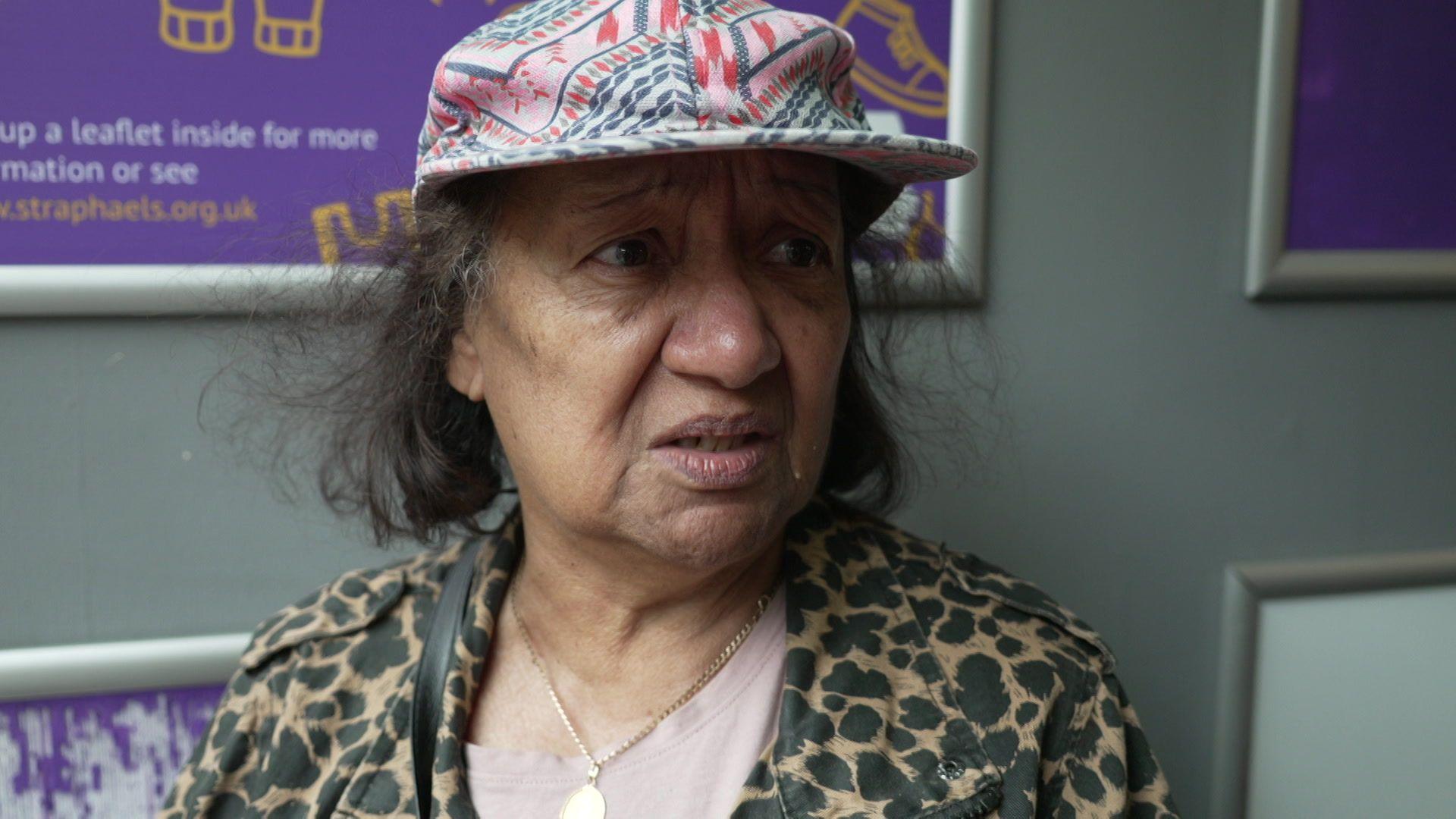
One woman said she felt there was anger in the community over migrants crossing the Channel in small boats
Another woman said she felt the flags were a reaction to the way that Sutton had changed over time.
"It's shocking," she said. "It's crowded, it's become dirty, you've got buildings everywhere, it never used to be like this.
"We all used to live happy together, but because of what's happened with these boat people, people are getting really angry."
A spokesperson for Sutton Council said the borough was "a friendly, diverse, welcoming borough, where people look out for each other and their local area".
"People should be free to fly flags on their own homes or businesses, but of course they need permission when it comes to someone else's property or public property, to avoid trespass, vandalism or criminal damage," they said.
"Sutton will continue to fly the national flag from public buildings with pride.
"But we will be taking down unauthorised flags of any sorts for these reasons and because they can, in some cases, pose a risk to health and safety."
Additional reporting by Jess Warren, BBC News.
Listen to the best of BBC Radio London on Sounds and follow BBC London on Facebook, external, X, external and Instagram, external. Send your story ideas to hello.bbclondon@bbc.co.uk, external